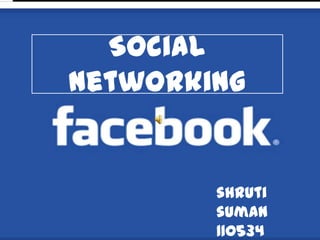social networking
- 1. Social networking shruti sumaN 110534
- 2. what is social networking?  social networking is the grouping of individuals into specific groups, like small rural communities or a neighborhood subdivision, if you will. Although social networking is possible in person, especially in the workplace, universities, and high schools, it is most popular online.  This is because unlike most high schools, colleges, or workplaces, the internet is filled with millions of individuals who are looking to meet other people, to gather and share first-hand information and experiences about cooking, golfing, gardening, developing friendships or professional alliances, finding employment, business-to-business marketing and even groups  there are dangers associated with social networking including data theft and viruses, which are on the rise. The most prevalent danger though often involves online predators or individuals who claim to be someone that they are not.
- 3. list of social networking sites  Facebook  Twitter  MySpace  LinkedIn  Friendster  Hi5  Orkut  NetLog  Badoo  Meetup  Digg  Stumbleupon  Ning
- 4. Growth in social networking patents
- 5. Social networking sites logos
- 6. Percentage of people using social networking
- 7. Pros of social networking sites  Get Feedback You can use social networking to get feedback on ideas immediately, or to ask questions and get answers quickly. If you're developing a product or even just an idea, you can bounce it off your friends and social networking contacts and find out what they think about it. You can also ask questions and receive answers in near- real-time, if your contacts know the answer or if you're a student in touch with teachers.
- 8.  Share Multiple Points of View Sheltered individuals may not understand how many different points of view that people have, and that it's possible for people to hold drastically different beliefs. Social networking helps you learn about diversity and get exposure to multiple points of view. Ultimately, this exposure can help you to learn to look at things from different angles, and be more tolerant of other people's opinions, things that go a long way in the working world
- 9.  Stay in Touch Anywhere Mobile social networking is becoming increasingly popular as more and more people have cell phones capable of running social networking applications. People can use mobile social networking tools to stay in touch with friends, and make plans on the fly. Mobile social networking tools are also great if you've got a long train or subway commute and want to stay in touch with friends and find out what they're doing.
- 10. Cons of social networking sites  Lack of Anonymity You are putting out information about your name, location, age, gender, and many other types of information that you may not want to let others know. Most people would say be careful, but no one can be certain at any given time. As long as people can know who you exactly are, then some can find ways to do you in.
- 11.  Scams and Harassment There is a potential for failure of security in both personal and business context. While many sites apply certain measures to keep any of these cases of harassment, cyber- stalking, online scams, and identity theft to an absolute minimum, you still may never know.
- 12.  Time Consuming If this is not your kind of thing, that it would just be a waste of time for you. The key to social networking is that it is supposed to be fun, whether you are just doing it for kicks or clicking around for business purposes. That should be reasonable enough for anyone, but there are those people who don't see the point. For them, it can be a disadvantage.
- 14. Online gaming on social sites
- 16. conclusion  Online social networking offers people great convenience for social networking. It allows people to keep in touch with friends, reconnect with old friends or acquaintances, meet new people, and even conduct business with the click of a few buttons. You can find people with similar interests as you and get to know them better, even if they are in a different country without having to worry about an enormous phone bill or going over the restricted minutes on a phone card.  However, like all things, nothing can be too good to be true. With an increased amount of time spent on the Internet comes with consequences. As studies have shown, the more time spent on the Internet browsing through online communities and chatting through instant messenger means less time spent socializing with real people. People slowly become disembodied with real life and believe they live in a virtual world with virtual friends. As they begin to lose touch with other people, they increasingly isolate themselves, and according to Durkheim’s theory of egoistic suicide, being socially isolated leads to suicide. Though suicide is quite drastic in this sense, it explains how people can become depressed. Therefore, even though it has its benefits in the virtual world, the real world is greatly impeded by the increasing use of online social networking.
- 17.  

















